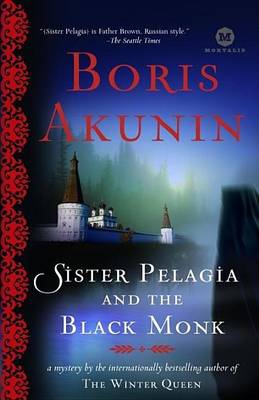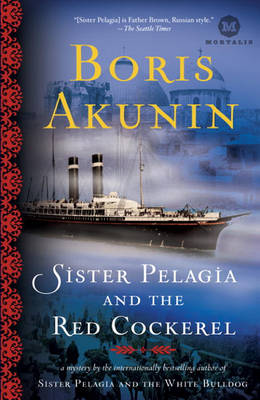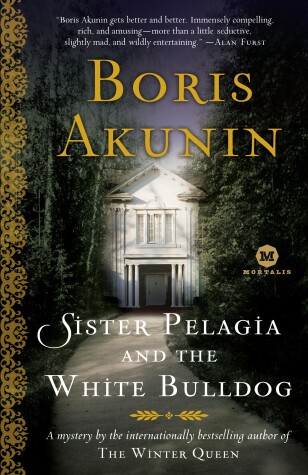Sister Pelagia
3 primary works
Book 1
Fans of Sister Pelagia and the White Bulldog, the first book in Akunin’s Pelagia trilogy, will be instantly mesmerized–and frightened–by this latest foray into Zavolzhsk’ s spiritual underworld.
In the middle of the night, a disheveled and badly frightened monk arrives at the doorstep of Bishop Mitrofanii of Zavolzhsk, crying: “Something’s wrong at the Hermitage!” The Hermitage is the centuries-old island monastery of New Ararat, known for its tradition of severely penitent monks, isolated environs, and a mental institution founded by a millionaire in self-imposed exile. Hearing the monk’s eerie message, Mitrofanii’s befuddled but sharp-witted ward Sister Pelagia begs to visit New Ararat and uncover the mystery. Traditions prevail–no women are allowed–and the bishop sends other wards to test their fates against the Black Monk that haunts the once serene locale. But as the Black Monk claims more victims–including Mitrofanii’s envoys–Pelagia goes undercover to see exactly what person, or what spirit, is at the bottom of it all.
Praise for Sister Pelagia and the Black Monk
“For all his status as a globe-circling bestseller, Akunin keeps faith in his sleekly engineered and allusive whodunnits with the classical virtues of Russian prose. . . . That polish lends his books a peculiar charm.”–The Independent (London)
“Readers can hear echoes of Leo Tolstoy, Fyodor Dostoevsky and Anton Chekov in whodunits that, because of their literary overtones, can be guiltlessly consumed as entertainment.”—Los Angeles Times
In the middle of the night, a disheveled and badly frightened monk arrives at the doorstep of Bishop Mitrofanii of Zavolzhsk, crying: “Something’s wrong at the Hermitage!” The Hermitage is the centuries-old island monastery of New Ararat, known for its tradition of severely penitent monks, isolated environs, and a mental institution founded by a millionaire in self-imposed exile. Hearing the monk’s eerie message, Mitrofanii’s befuddled but sharp-witted ward Sister Pelagia begs to visit New Ararat and uncover the mystery. Traditions prevail–no women are allowed–and the bishop sends other wards to test their fates against the Black Monk that haunts the once serene locale. But as the Black Monk claims more victims–including Mitrofanii’s envoys–Pelagia goes undercover to see exactly what person, or what spirit, is at the bottom of it all.
Praise for Sister Pelagia and the Black Monk
“For all his status as a globe-circling bestseller, Akunin keeps faith in his sleekly engineered and allusive whodunnits with the classical virtues of Russian prose. . . . That polish lends his books a peculiar charm.”–The Independent (London)
“Readers can hear echoes of Leo Tolstoy, Fyodor Dostoevsky and Anton Chekov in whodunits that, because of their literary overtones, can be guiltlessly consumed as entertainment.”—Los Angeles Times
Book 2
The ship carrying the devout to Jerusalem has run into rough waters. Onboard is Manuila, controversial leader of the “Foundlings,” a sect that worships him as the Messiah. But soon the polarizing leader is no longer a passenger or a prophet but a corpse, beaten to death by someone almost supernaturally strong. But not everything is as it seems, and someone else sailing has become enmeshed in the mystery: the seemingly slow but actually astute sleuth Sister Pelagia. Her investigation of the crime will take her deep into the most dangerous areas of the Middle East and Russia, running from one-eyed criminals and after such unlikely animals as a red cockerel that may be more than a red herring. To her shock, she will emerge with not just the culprit in a murder case but a clue to the earth’s greatest secret.
Sister Pelagia and the Red Cockerel features its beloved heroine’s most exciting and explosive inquiry yet, one that just might shake the foundations of her faith.
Sister Pelagia and the Red Cockerel features its beloved heroine’s most exciting and explosive inquiry yet, one that just might shake the foundations of her faith.
Book 3
“Pelagia’s family likeness to Father Brown and Miss Marple is marked, and reading about her supplies a similarly decorous pleasure.”
–The Literary Review
In a remote Russian province in the late nineteenth century, Bishop Mitrofanii must deal with a family crisis. After learning that one of his great aunt’s beloved and rare white bulldogs has been poisoned, the Orthodox bishop knows there is only one detective clever enough to investigate the murder: Sister Pelagia.
The bespectacled, freckled Pelagia is lively, curious, extraordinarily clumsy, and persistent. At the estate in question, she finds a whole host of suspects, any one of whom might have benefited if the old lady (who changes her will at whim) had expired of grief at the pooch’s demise. There’s Pyotr, the matron’s grandson, a nihilist with a grudge who has fallen for the maid; Stepan, the penniless caretaker, who has sacrificed his youth to the care of the estate; Miss Wrigley, a mysterious Englishwoman who has recently been named sole heiress to the fortune; Poggio, an opportunistic and freeloading “artistic” photographer; and, most intriguingly, Naina, the old lady’s granddaughter, a girl so beautiful she could drive any man to do almost anything.
As Pelagia bumbles and intuits her way to the heart of a mystery among people with faith only in greed and desire, she must bear in mind the words of Saint Paul: “Beware of dogs–and beware of evil-doers.”
“Critics on both sides of the Atlantic have praised [Akunin’s] clever plots, vivid characters and wit.”
–Baltimore Sun
“Akunin’s wonderful novels are always intricately webbed and plotted.”
–The Providence Journal
–The Literary Review
In a remote Russian province in the late nineteenth century, Bishop Mitrofanii must deal with a family crisis. After learning that one of his great aunt’s beloved and rare white bulldogs has been poisoned, the Orthodox bishop knows there is only one detective clever enough to investigate the murder: Sister Pelagia.
The bespectacled, freckled Pelagia is lively, curious, extraordinarily clumsy, and persistent. At the estate in question, she finds a whole host of suspects, any one of whom might have benefited if the old lady (who changes her will at whim) had expired of grief at the pooch’s demise. There’s Pyotr, the matron’s grandson, a nihilist with a grudge who has fallen for the maid; Stepan, the penniless caretaker, who has sacrificed his youth to the care of the estate; Miss Wrigley, a mysterious Englishwoman who has recently been named sole heiress to the fortune; Poggio, an opportunistic and freeloading “artistic” photographer; and, most intriguingly, Naina, the old lady’s granddaughter, a girl so beautiful she could drive any man to do almost anything.
As Pelagia bumbles and intuits her way to the heart of a mystery among people with faith only in greed and desire, she must bear in mind the words of Saint Paul: “Beware of dogs–and beware of evil-doers.”
“Critics on both sides of the Atlantic have praised [Akunin’s] clever plots, vivid characters and wit.”
–Baltimore Sun
“Akunin’s wonderful novels are always intricately webbed and plotted.”
–The Providence Journal


